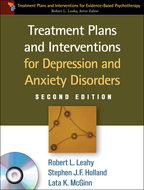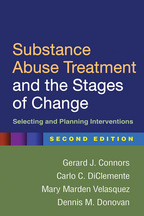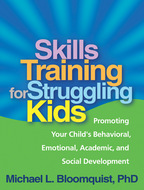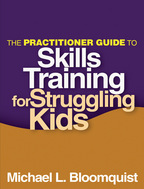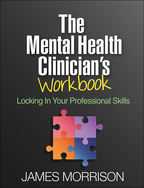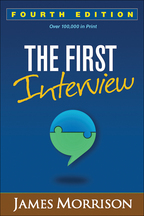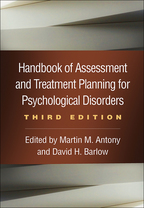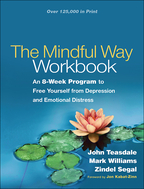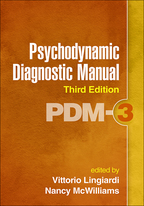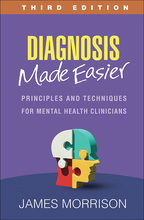Essentials of Psychiatric Diagnosis
Revised Edition
Responding to the Challenge of DSM-5®
Allen Frances
Paperbacke-bookprint + e-book
Paperback
orderAugust 16, 2013
ISBN 9781462513482
Price: $43.00218 Pages
Size: 6" x 9"
Sign up for emails on upcoming titles on Trauma & PTSD (with special discounts)!
“[This work] represents the kind of valuable clinical wisdom that one accumulates after years of diagnostic experience....Clinical pearls focus in particular on the fuzzy boundaries and grey areas between threshold diagnoses and non-diagnostic problems of living, as well as Dr. Frances's concerns about diagnostic inflation in psychiatry.”

—Psychiatric Times
“The book is for anyone interested in psychiatric diagnosis, and the author specifically mentions that the book will assist busy primary care doctors to be directed toward an accurate diagnosis. As a director of behavioral medicine for a family medicine residency, I see value in the book for physicians as the author mentions as well that it is a quick reference….I would especially recommend this work to other behavioral scientists working in family medicine. It provides some key teaching points for students and residents….Dr. Frances is not one for superficial rambling, and he gets to the points that need to be made in this book….The wisdom that is derived by the experience of a master clinician in psychiatry comes through its pages.”

—Society of Teachers of Family Medicine
“The book is well organized….[It] is useful to school social workers….Although the new DSM-5 uses ICD10 codes, with the help of Frances’s book, a school social worker will be able to recognize codes that may be included on a psychiatrist’s report.”

—School Social Work Journal
“This is a very worthwhile book that highlights concerns about DSM-5 that many will share.”

—Journal of Clinical Psychiatry
“This book does not follow the organizational structure found in the DSM-5. Instead, it presents disorders roughly in the order of their frequency of being encountered in clinical practice, which does, in my opinion, make the book more interesting and useful….I can see using this book as a useful secondary text in teaching master of social work (MSW) students about using the DSM….Supplementing…with Frances’s Essentials of Psychiatric Diagnosis will greatly help in developing a clinical social worker’s diagnostic skills….We need to learn the DSM-5 and learn to use it well. Allen Frances’s Essentials of Psychiatric Diagnosis can be a very useful tool to help us achieve this goal of professional social work education.”

—Research on Social Work Practice
“Much of the value of this book rests not only in its critical assessment of the DSM-5 but of psychiatric diagnosis in general….This is an important book. It is concise and readable. It adds clinical insight coupled with many years of experience to the somewhat dry task of explaining all of the currently ‘in vogue’ criteria defining mental illnesses. Frances is forthcoming and candid. Where he sees common sense being utilized, he provides praise. Where he believes steps have been taken that are questionable, he clearly provides his input. While one would like to believe that there are no politics in diagnosis, this book puts that conception to rest. Frances has succeeded in his goals. He has taken the very difficult task of ‘shrinking’ the DSM-5 into a focused and readable commentary and explanation. He also provides the corresponding ICD-10 (International Classification of Disease) codes that are parallel to the DSM….For many, when faced with the choice between buying the DSM-5 from the American Psychiatric Association or buying Frances’s version, buying this book may be a realistic and, no doubt, less expensive alternative.”

—Child and Family Behavior Therapy
“Essentials of Psychiatric Diagnosis is simply the best book I’ve read about how to accurately diagnose your patients. Frances's combination of vast experience, down-in-the-trenches common sense, and informed skepticism is unique. Whether you’re a psychiatrist, psychologist, social worker, nurse, crisis counselor, or any other mental health professional, you should buy this book, read it cover to cover initially, and then keep it in your office to refer back to frequently. I’m glad this book had not been published before I wrote my book on the psychiatric interview, because the competition would have made me choose a different topic!”

—Daniel J. Carlat, MD, Department of Psychiatry, Tufts University School of Medicine; Founding Editor, The Carlat Psychiatry Report
“With his clinical expertise, leadership roles in prior DSM editions, and healthy skepticism about overdiagnosis and excessive medication, Frances has crafted a clinical gem. This clear and concise book describes a sequential assessment process and provides screening questions, easily remembered prototypic descriptions, differential diagnostic considerations, and cautionary notes about diagnostic traps. Frances recognizes the need for a diagnosis to guide intervention, while steering clear of diagnostic reification. All clinicians need this book for frequent reference, and it should be a required text in mental health training programs.”

—John F. Clarkin, PhD, Personality Disorders Institute, New York Presbyterian Hospital; Department of Psychiatry, Weill Cornell Medical College
“This easy-to-read, commonsensical handbook guides mental health clinicians through the thicket of differential diagnosis in psychiatry. Frances—a thoughtful and effective critic of the excesses of DSM-5—shows where diagnosis is valid and essential, and where a premature diagnosis or a diagnostic fad has the potential to hurt patients. Everyone who uses diagnosis in daily practice will benefit from the down-to-earth wisdom of this book.”

—Joel Paris, MD, Department of Psychiatry, McGill University, Canada
“A 'must have' for mental health professionals. Frances provides useful, easy-to-understand information about psychiatric diagnosis and coding for clinicians in all mental health disciplines.”

—K. Dayle Jones, PhD, LMHC, Mental Health Counseling Program, University of Central Florida
“Frances demonstrates an unusual ability to communicate the tacit knowledge of an expert into understandable concepts and ideas that will be appreciated by clinicians and students alike. Elegantly simple screening questions precede each disorder and cut through the diagnostic murk. Facilitating patient-centered care, teamwork, and collaboration, this is a comprehensive diagnostic resource for the whole treatment team.”

—Margaret (Peggy) Halter, PhD, APRN, Editor, Foundations of Psychiatric Mental Health Nursing; Associate Dean, Dwight Schar College of Nursing and Health Sciences, Ashland University
“This volume should head the list of user-friendly guides to psychiatric diagnosis. Frances draws on his considerable experience and contributions, such as heading the DSM-IV Task Force, to produce a work that will be indispensable for primary care clinicians and all professionals and students in mental health care. The guide contains screening questions, prototypic case descriptions, ICD-9-CM codes (and ICD-10-CM codes where feasible), and specific cautionary statements to reduce diagnostic inflation and raise concerns about aspects of DSM-5. The material is handled with sensitivity and compassion, with the patient's best interests always the central consideration. This book is a welcome arrival at a time when recent trends in diagnosis are increasingly attracting controversy. I will be using this excellent guide in my own work and will recommend it to my students and colleagues.”

—Adrian Wells, PhD, Division of Clinical Psychology, University of Manchester, United Kingdom
“Anyone who brings a critical perspective to psychiatric diagnosis will welcome this book's truly refreshing, reader-friendly approach. Frances, a well-known, respected psychiatrist, offers up what is clearly a lifetime synthesis of wisdom and knowledge on diagnosis. Rejecting the cumbersome detailing of esoteric diagnostic criteria found elsewhere, Frances presents a simpler, consumable structure for readers. Importantly, he includes specific DSM-5-related cautions and caveats. Social workers will appreciate that Frances begins discussion of the diagnostic interview with a section called 'The Relationship Comes First'—and that he argues the client should actually be part of the diagnostic team. This is good stuff.”

—Kia J. Bentley, PhD, LCSW, School of Social Work, Virginia Commonwealth University
“This uncluttered, visually appealing guide will assist all primary care physicians in the care of patients with psychiatric illnesses.”

—Elizabeth S. White, MD, internist, Settlement Health, New York City
“I selected this book as a required text in my master's-level course on the DSM. This is the best companion to the DSM that I have found since I began teaching this course. Many of my students have limited experience with psychiatric assessment and diagnosis, and find the DSM overwhelming and off-putting. Frances provides the perfect counterbalance to DSM-5 orthodoxy. His book is filled with clinical practice wisdom that will benefit students in their day-to-day work with clients. I expect that this will be one of the books that students keep on their shelves well after graduation as they work in the field. Social workers are the largest provider group of mental health care; this user-friendly resource will help them develop the skills they need to accurately assess and diagnose.”

—Mark J. Brenner, PhD, ACSW, LICSW, Professor and Graduate Program Coordinator, School of Social Work, Bridgewater State University
—Psychiatric Times
“The book is for anyone interested in psychiatric diagnosis, and the author specifically mentions that the book will assist busy primary care doctors to be directed toward an accurate diagnosis. As a director of behavioral medicine for a family medicine residency, I see value in the book for physicians as the author mentions as well that it is a quick reference….I would especially recommend this work to other behavioral scientists working in family medicine. It provides some key teaching points for students and residents….Dr. Frances is not one for superficial rambling, and he gets to the points that need to be made in this book….The wisdom that is derived by the experience of a master clinician in psychiatry comes through its pages.”
—Society of Teachers of Family Medicine
“The book is well organized….[It] is useful to school social workers….Although the new DSM-5 uses ICD10 codes, with the help of Frances’s book, a school social worker will be able to recognize codes that may be included on a psychiatrist’s report.”
—School Social Work Journal
“This is a very worthwhile book that highlights concerns about DSM-5 that many will share.”
—Journal of Clinical Psychiatry
“This book does not follow the organizational structure found in the DSM-5. Instead, it presents disorders roughly in the order of their frequency of being encountered in clinical practice, which does, in my opinion, make the book more interesting and useful….I can see using this book as a useful secondary text in teaching master of social work (MSW) students about using the DSM….Supplementing…with Frances’s Essentials of Psychiatric Diagnosis will greatly help in developing a clinical social worker’s diagnostic skills….We need to learn the DSM-5 and learn to use it well. Allen Frances’s Essentials of Psychiatric Diagnosis can be a very useful tool to help us achieve this goal of professional social work education.”
—Research on Social Work Practice
“Much of the value of this book rests not only in its critical assessment of the DSM-5 but of psychiatric diagnosis in general….This is an important book. It is concise and readable. It adds clinical insight coupled with many years of experience to the somewhat dry task of explaining all of the currently ‘in vogue’ criteria defining mental illnesses. Frances is forthcoming and candid. Where he sees common sense being utilized, he provides praise. Where he believes steps have been taken that are questionable, he clearly provides his input. While one would like to believe that there are no politics in diagnosis, this book puts that conception to rest. Frances has succeeded in his goals. He has taken the very difficult task of ‘shrinking’ the DSM-5 into a focused and readable commentary and explanation. He also provides the corresponding ICD-10 (International Classification of Disease) codes that are parallel to the DSM….For many, when faced with the choice between buying the DSM-5 from the American Psychiatric Association or buying Frances’s version, buying this book may be a realistic and, no doubt, less expensive alternative.”
—Child and Family Behavior Therapy
“Essentials of Psychiatric Diagnosis is simply the best book I’ve read about how to accurately diagnose your patients. Frances's combination of vast experience, down-in-the-trenches common sense, and informed skepticism is unique. Whether you’re a psychiatrist, psychologist, social worker, nurse, crisis counselor, or any other mental health professional, you should buy this book, read it cover to cover initially, and then keep it in your office to refer back to frequently. I’m glad this book had not been published before I wrote my book on the psychiatric interview, because the competition would have made me choose a different topic!”
—Daniel J. Carlat, MD, Department of Psychiatry, Tufts University School of Medicine; Founding Editor, The Carlat Psychiatry Report
“With his clinical expertise, leadership roles in prior DSM editions, and healthy skepticism about overdiagnosis and excessive medication, Frances has crafted a clinical gem. This clear and concise book describes a sequential assessment process and provides screening questions, easily remembered prototypic descriptions, differential diagnostic considerations, and cautionary notes about diagnostic traps. Frances recognizes the need for a diagnosis to guide intervention, while steering clear of diagnostic reification. All clinicians need this book for frequent reference, and it should be a required text in mental health training programs.”
—John F. Clarkin, PhD, Personality Disorders Institute, New York Presbyterian Hospital; Department of Psychiatry, Weill Cornell Medical College
“This easy-to-read, commonsensical handbook guides mental health clinicians through the thicket of differential diagnosis in psychiatry. Frances—a thoughtful and effective critic of the excesses of DSM-5—shows where diagnosis is valid and essential, and where a premature diagnosis or a diagnostic fad has the potential to hurt patients. Everyone who uses diagnosis in daily practice will benefit from the down-to-earth wisdom of this book.”
—Joel Paris, MD, Department of Psychiatry, McGill University, Canada
“A 'must have' for mental health professionals. Frances provides useful, easy-to-understand information about psychiatric diagnosis and coding for clinicians in all mental health disciplines.”
—K. Dayle Jones, PhD, LMHC, Mental Health Counseling Program, University of Central Florida
“Frances demonstrates an unusual ability to communicate the tacit knowledge of an expert into understandable concepts and ideas that will be appreciated by clinicians and students alike. Elegantly simple screening questions precede each disorder and cut through the diagnostic murk. Facilitating patient-centered care, teamwork, and collaboration, this is a comprehensive diagnostic resource for the whole treatment team.”
—Margaret (Peggy) Halter, PhD, APRN, Editor, Foundations of Psychiatric Mental Health Nursing; Associate Dean, Dwight Schar College of Nursing and Health Sciences, Ashland University
“This volume should head the list of user-friendly guides to psychiatric diagnosis. Frances draws on his considerable experience and contributions, such as heading the DSM-IV Task Force, to produce a work that will be indispensable for primary care clinicians and all professionals and students in mental health care. The guide contains screening questions, prototypic case descriptions, ICD-9-CM codes (and ICD-10-CM codes where feasible), and specific cautionary statements to reduce diagnostic inflation and raise concerns about aspects of DSM-5. The material is handled with sensitivity and compassion, with the patient's best interests always the central consideration. This book is a welcome arrival at a time when recent trends in diagnosis are increasingly attracting controversy. I will be using this excellent guide in my own work and will recommend it to my students and colleagues.”
—Adrian Wells, PhD, Division of Clinical Psychology, University of Manchester, United Kingdom
“Anyone who brings a critical perspective to psychiatric diagnosis will welcome this book's truly refreshing, reader-friendly approach. Frances, a well-known, respected psychiatrist, offers up what is clearly a lifetime synthesis of wisdom and knowledge on diagnosis. Rejecting the cumbersome detailing of esoteric diagnostic criteria found elsewhere, Frances presents a simpler, consumable structure for readers. Importantly, he includes specific DSM-5-related cautions and caveats. Social workers will appreciate that Frances begins discussion of the diagnostic interview with a section called 'The Relationship Comes First'—and that he argues the client should actually be part of the diagnostic team. This is good stuff.”
—Kia J. Bentley, PhD, LCSW, School of Social Work, Virginia Commonwealth University
“This uncluttered, visually appealing guide will assist all primary care physicians in the care of patients with psychiatric illnesses.”
—Elizabeth S. White, MD, internist, Settlement Health, New York City
“I selected this book as a required text in my master's-level course on the DSM. This is the best companion to the DSM that I have found since I began teaching this course. Many of my students have limited experience with psychiatric assessment and diagnosis, and find the DSM overwhelming and off-putting. Frances provides the perfect counterbalance to DSM-5 orthodoxy. His book is filled with clinical practice wisdom that will benefit students in their day-to-day work with clients. I expect that this will be one of the books that students keep on their shelves well after graduation as they work in the field. Social workers are the largest provider group of mental health care; this user-friendly resource will help them develop the skills they need to accurately assess and diagnose.”
—Mark J. Brenner, PhD, ACSW, LICSW, Professor and Graduate Program Coordinator, School of Social Work, Bridgewater State University


